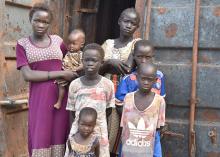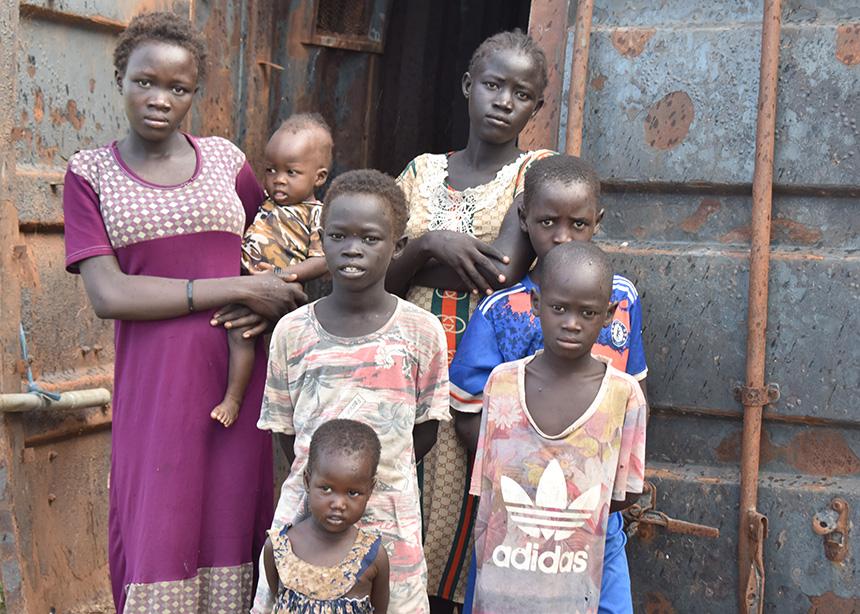Nyawar Mapieny Gathoul’s baby and siblings are hungry. The father of her six-month-old isn’t around to help and, at just 17, the young mother also cares for her seven siblings because their parents have died. Nyawar is strong, resilient and hardworking. But the family has only enough food for one meal a day.
Gathoul and her siblings were forced to flee their home due to violence, finding safety in a displaced persons camp in South Sudan. A Mennonite Central Committee (MCC) partner helped by distributing monthly food rations to families living in the camp. But then the floodwaters came. The surging water destroyed their small home. They waded barefoot through the camp, surveying their waterlogged possessions. For Gathoul, it was loss upon loss, grief upon grief. Basic supplies became even more difficult to access.
The factors that contribute to the family’s lack of food are complex and varied. Gathoul’s story is just a snapshot of the hunger crisis raging throughout sub-Saharan Africa.
To better understand this hunger crisis, Bruce Guenther, MCC’s disaster response director, answers a few questions:
Q: What is happening with the global food supply right now?
A: Right now, 10 percent of the world goes to bed hungry. Of those, around 50 million people are at crisis levels of hunger, teetering on the edge of famine. That’s up from 27 million in 2019, before the pandemic began. This hunger crisis has been triggered by several factors. Conflict, disaster and rising food prices are the main things that disrupt people’s ability to access food.
Q: What does the conflict in Ukraine have to do with global hunger?
A: Ukraine is a major food producer, particularly for sub-Saharan Africa and the Middle East. Ukraine exports goods like wheat, maize (corn), barley and sunflower oil. The conflict in Ukraine is having a direct impact on global food supplies, with ports being closed and goods unable to leave the country. This means food prices are rising around the world. In Syria, for example, the cost of MCC food assistance programs has increased by approximately 22 percent.
Q: Are there other factors that contribute to the crisis?
A: Absolutely. We are seeing other factors come into play, such as changing weather patterns. In areas like South Sudan, for example, devasting flooding is wiping out crops and creating even higher need for humanitarian response. Then we look at the transportation costs involved in getting food to families who need it—the soaring price of oil has a huge impact on food supply. It’s a lot of things all happening at once and the effects are really adding up.
Q: How does conflict make global hunger worse?
A: There are four main ways someone accesses food. The first one is to produce it yourself. The second is through labour; you work and earn a wage, then buy food with that money. Third, you trade for it; maybe you raise goats, then trade those goats for chickens or eggs. Fourth, you access food through transfers, such as social safety nets like emergency food assistance.
Conflict disrupts every one of those. People may lose their regular jobs when conflict breaks out. Or they might be displaced from their land. Essential goods become more expensive, and people sell assets. And, logistically, emergency food distribution is much more challenging in conflict settings.
Q: What is MCC hearing from our partners about the hunger crisis?
A: Partners tell us this crisis is severely impacting people’s everyday lives. Food prices are too high for many families to afford what they need, and we know the same is true for many Canadian and U.S. families. Costs are also higher for MCC to buy food locally and to provide food assistance for people who were already vulnerable because of conflict or drought. This just pushes more and more people into poverty and desperate situations.
Q: What is MCC doing to respond?
A: We are scaling up our humanitarian response globally, including significant responses in Ethiopia, Kenya, Malawi, South Sudan and Zimbabwe. We also have our largest emergency food assistance programs in Syria and Lebanon. The reality is, we need more resources to continue to provide the same level of assistance to people we were already supporting.
Q: Why is MCC Canada appealing with the Humanitarian Coalition?
A: MCC Canada is part of the Humanitarian Coalition through our membership in Canadian Foodgrains Bank. The benefit of the coalition—a group of 12 Canadian charities collaborating together to respond to humanitarian disasters—is that we’re stronger together than apart. We can co-ordinate messaging with a lot of other humanitarian agencies, so Canadians get a clear message about how they can respond to crises. And by working as a group, we can work with the Government of Canada to leverage matching funds for the response. It’s a win-win for everyone involved, especially those families who are on the brink of starvation.
As a member of Canadian Foodgrains Bank, MCC Canada is joining the Humanitarian Coalition's hunger crisis appeal. The Government of Canada will match donations, up to $5 million, from individual Canadians until July 17. To donate to this time-limited campaign, visit https://donation.mcccanada.ca/hunger-crisis/.

Nyawar Mapieny Gathoul, 17, holds her six-month-old son, Zoal Mapiny Gai. She stands with some of her younger brothers and sisters who she also cares for because their parents have died. They live on monthly food distributions from MCC partner SSUDRA. They also buy small amounts of food with money they make by gathering wood. The young family lives in Rubkona, an informal settlement camp in Unity State, South Sudan. (MCC photo by Tadeo Santonino)



Add new comment
Canadian Mennonite invites comments and encourages constructive discussion about our content. Actual full names (first and last) are required. Comments are moderated and may be edited. They will not appear online until approved and will be posted during business hours. Some comments may be reproduced in print.